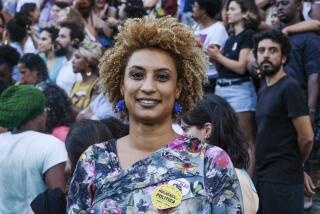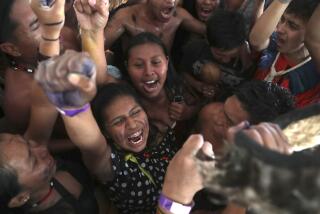Brazilian Land Activist Is Cleared of Murder
- Share via
VITORIA, Brazil — A charismatic leader of Brazil’s land reform movement was acquitted Wednesday of murder charges in a trial that has focused attention on the plight of the country’s poor farm workers.
Jose Rainha Jr., leader of the Landless Rural Workers Movement, had been charged with being the mastermind behind the killing of two men during a botched attempt to take over a farm in 1989. At his first trial three years ago, he was convicted and sentenced to 26 1/2 years in prison.
His appeal, which began Monday in this port city, refocused attention on the often bloody land disputes that have cost more than 1,000 lives in Brazil in the past decade.
The jury of six men and one woman took only 40 minutes to acquit Rainha by a vote of 4 to 3 in the killing of farm owner Jose Machado Neto and an off-duty policeman. In Brazil, a majority of the jury is all that is needed to acquit or convict.
“The truth is like divine justice,” Rainha said after the verdict. “It may take a while to arrive, but it always emerges.”
Supporters erupted into cheers as the verdict was read. They carried Rainha on their shoulders to a nearby square where thousands of movement members had camped out to watch the proceedings on a giant television screen.
Prosecutors said they would file an appeal on the grounds that defense witnesses had communicated with each other during the trial.
During the attempted takeover in 1989, farm owner Machado and several hired gunmen opened fire on the invaders, according to movement members. Machado and one of the gunmen, the off-duty policeman, were killed and four squatters wounded.
Rainha was accused not of pulling the trigger but of being the “intellectual author” of the slayings. The nine men accused of firing on the victims remain at large.
At the first trial, Rainha was convicted even though prosecutors produced no witnesses and the sworn depositions contained just vague descriptions of the defendant.
Rainha’s supporters and human rights groups claim that the charges were concocted to silence him and weaken his popular movement just as it was beginning to garner support from Brazil’s middle class.
Prosecutors, who described Rainha as a rabble-rouser who incited the rural workers to violence, relied mainly on sworn statements from neighbors and testimony from people who claimed that they had “heard” Rainha was involved.
Rainha’s group organizes invasions of idle land to pressure the government to speed up agrarian reform in a country where the richest 20% of the people hold 90% of the land, while the poorest 40% own just 1%.
More to Read
Sign up for Essential California
The most important California stories and recommendations in your inbox every morning.
You may occasionally receive promotional content from the Los Angeles Times.











